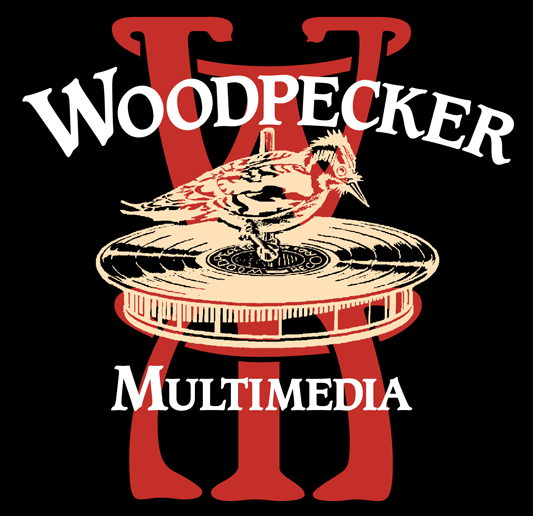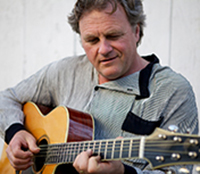 REVIEWS of "In Person" by
Harvey Reid REVIEWS of "In Person" by
Harvey Reid
Sing Out Magazine
(1998)
Autoharp virtuoso and former nation guitar champion Harvey Reid has released
his 12th solo recording: an extravagant and varied two-CD collection of
live performances from 15 different shows. .. The breadth of Reid's musical
knowledge is amazing, and his picking is always accurate and stylish."
Portsmouth Herald (May 1997)
by Jared O'Connor
A mere glance at the song list of this two-disc compilation shows that
Harvey Reid is a walking repository of this country's folk music heritage.
As if it weren't enough that Reid has apparently immersed himself in every
musical style imaginable, these performnces demonstrate his ability to play
like a damn cyclone.
Maine resident Reid already has a near legendary reputation in foolk
music circles, but this was my first encounter with hi sstyle; let me assure
you, his technique is nothing short of astonishing. He wields with awe-inspiring
skill the 6-string, 12-string and slide guitar, autoharp, bouzouki, banjo,
and probably even a yo-yo string if he had to. His singular talent is evident
from the very first track: an instrumental of Reid's own composition played
on 12-string guitar, it eerily mimics the sound and droning melancholy of
Celtic bagpipes. Simply amazing.
"In Person," besides showcasing Reid's crisp and lyrical fingerpicking,
displays his startling command of roots music. He understands snd performs
bluegrass, Delta blues, Southern spirituals and traditional Appalachian
folk with devotion, passion, and complete fidelity to the spirit of the
originals. Twelve of the 30 tracks are of Reid's own writing, and it is
the highest compliment that I can pay that his originals lock seamlessly
with the haunting traditionals he does so well. You simply can't tell them
apart without checking the songwriting credits.
His "Sing Me A Lullaby" is a perfect tribute to blues spirituals;
Reid sounds as if he is channeling both Blind Willie Johnson and Willie
McTell in this gorgeous, poignant slide guitar masterpiece, a song that
nearly matches up to Willie Johnson's "Dark Was the Night, Cold Was
the Ground." However, his vocals, though slightly thin, are heartfelt
and honest, and triply compensated for by the strength of his songwriting
and the power of his peerless technique.
The production is clean and crisp; it's impossible to tell these songs
are live until you hear the audience cheer. It's likely that you will, too-
this is as good as modern folk music gets, by a master of the idiom. Have
I been raving? I suppose so, but as Chuck Berry would undoubtedly say if
he ever heard Reid: "When people pass him by they would stop and say,
my but that little country boy can play."
Dirty Linen
May 1997 by Jim Lee
Harvey Reid taped almost a year's worth of shows and culled the best
performances from them for this live album. Knowing that his normal recordings
usually run approximately 70 minutes, it's not surprising that he opted
for a 2-CD set with over 140 minutes of music, almost half of which is previously
unrecorded material.
What Reid can do can be overwhelming. Want some traditional music? Take
your pick. You have a number of Irish or Scottish tunes played on 12-string
or bouzouki (but check the credits carefully because they may be Reid originals.)
There's a stunningly good version of "John Barleycorn." There's
also traditional American music, a unique arrangement of "How Can I
Keep From Singing," a slide guitar "Gospel Medley" and a
set of fiddle tunes played on guitar.
There are a few tunes on the autoharp. Some amazing blues and steel guitar
work. Probably the definitive version of Woody Guthrie's "Vigilante
Man." An amusing 10-minute talking blues rendition of "Cocaine
Blues," recorded at Holstein's back in 1985, is the oldest track included.
What is sometimes lost in all of this is how good a songwriter Reid is.
Included here are "All or Nothing," and "Dreamer or Believer."
Reid isn't one to set boundaries on what he chooses to play, be it an
obscure Bill Monroe cover, a JJ Cale acoustic blues/rock song, or even an
old Jagger/Richard song. The unifying theme seems to be Reid's sheer joy
in playing the songs.
Reid has also chosen to include some of his spoken word intros, which
demonstrate his dry sense of humor. And as with all of Reid's recordings,
there are extensive liner notes to all the tracks, and lyrics to most of
the songs.
JAM Music Magazine
May 1997 by William Huffman
I'm not exactly sure what it is about Harvey Reid that sends chills down
my spine, but the best example of why he is such a revered folk musician
is the opening cut to his new live double-CD album In Person. "Off
to Adventure/A Windy Grave" is a Reid original that showcases his guitar
mastery and passionate preservation of Irish folk music.
Sure, most of the album is just him and mostly instrumental [note: this
is not true] but Reid has always known when and where to do exactly what
with hi or anybody else's music. Recorded from all over the country from
15 different concerts, this collection features music that he has released
before and some never heard on recording.
He touches on many music styles other than Celtic. He has entertained
thousands of people with his arrangements of American folk, both traditional
and contemporary, blues, gospel and more. Reid includes a number of covers
such as the Rolling Stones' "Spider & the Fly."
Even though it is recorded live, Reid's fingerplay can't be any more
crisp than on these two CD's. He has spent 25 years as possibly the most
unheralded of our modern minstrels. He has received much acclaim and many
offers, but his reclusive nature, that seems to fade on the concert stage,
has kept him as part of the country's folk underground.
His vocals are also very crisp and usually exude that same Irish folk
prowess and passion. The most beautiful song on the first CD is "To
the Western Wind," a duet with Lynn Rothermich, which was recorded
last Fall at the Unitarian Church in Portsmouth. Their vocals are extremely
compatible, both soothing and mesmerizing.
Even the CD booklet has a storytelling feel. Reid contributed the liner
notes with explicit notations for each song, including the concert from
which it came. Lyrics are also contained of the songs he penned. Musically,
he shows off his mastery without it taking away from the music. He used
a myriad of instruments from 6 and 12-string and slide guitars to autoharp
and bouzouki. The best feature of his expertise is the rhythm. He often
supplies a percussive rhythm using the guitar-slapping after strums and
his foot.
Some other reviews by fans, DJ's etc...
DON DONOFRIO's
REVIEW
|
 H
H

 H
H
